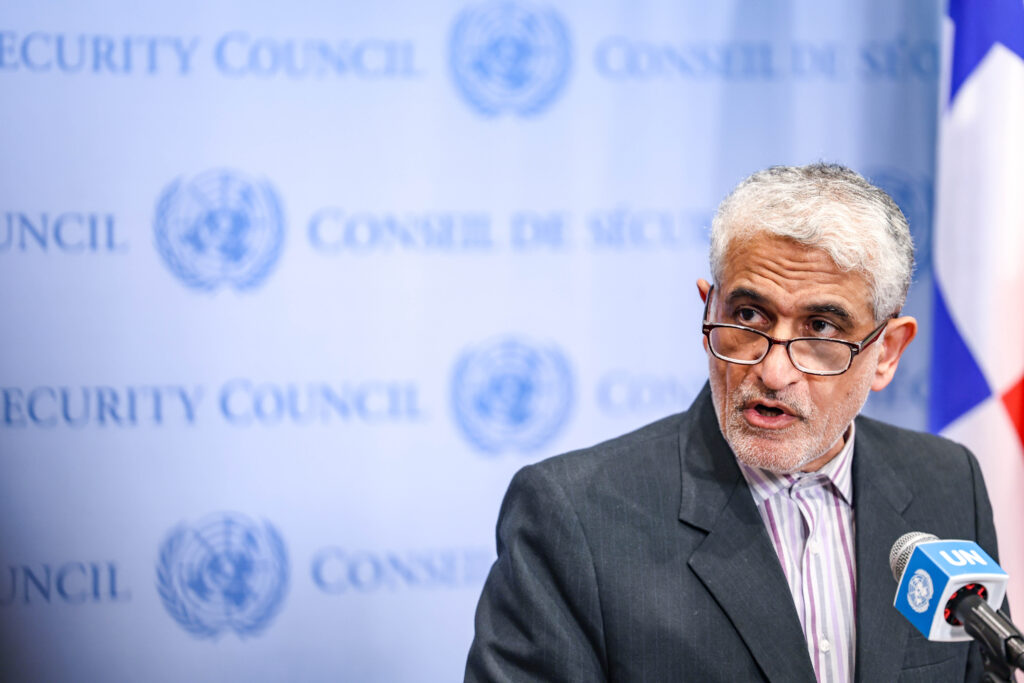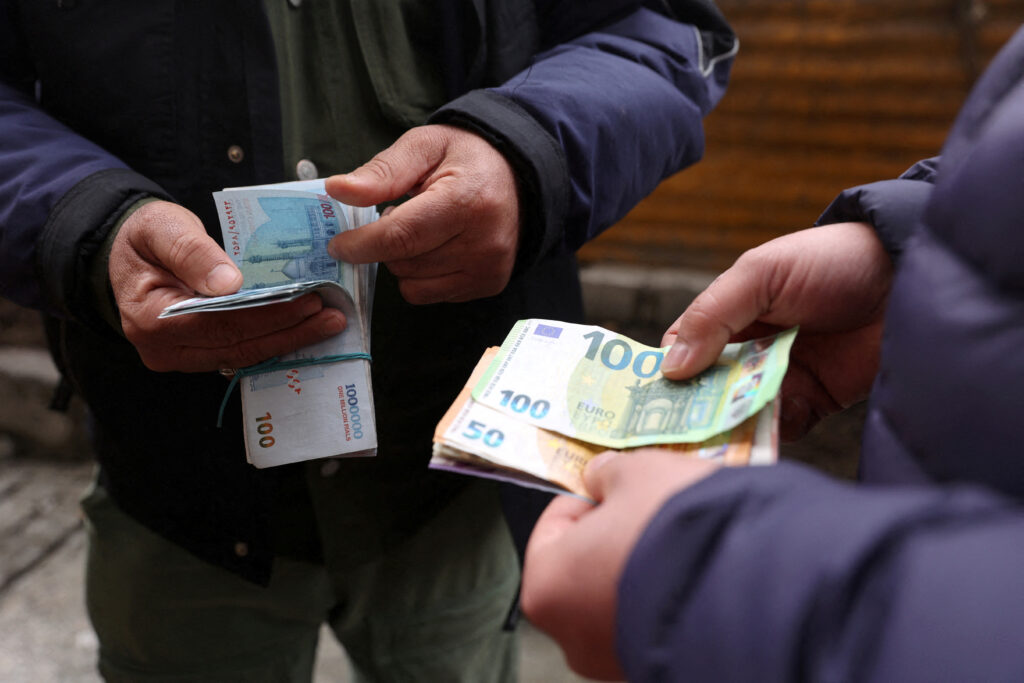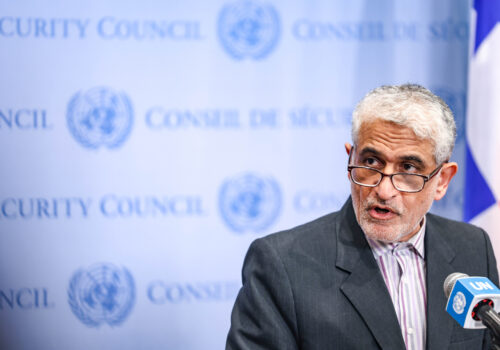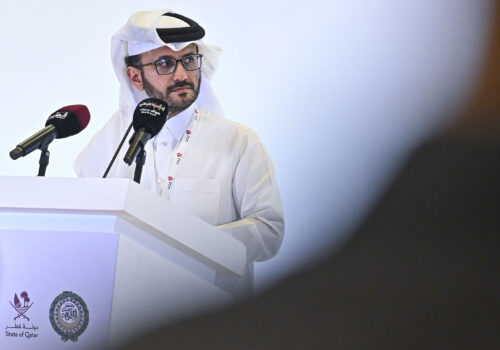Nuclear tensions between Iran and the West significantly intensified with the September reimposition of the pre-2015 United Nations (UN) sanctions on Tehran. This development was a result of the E3—France, Germany, and the United Kingdom—triggering the Joint Comprehensive Plan of Action (JCPOA)’s “snapback” mechanism one month earlier.
Consequently, Iran’s partnership with Russia, which views the reimposition of these UN sanctions as illegitimate, is likely to deepen. This development is expected to accelerate Tehran’s strategic pivot eastward, a shift that gained momentum after US President Donald Trump’s first administration withdrew from the JCPOA in May 2018.
Despite persistent mistrust, Iran and Russia are highly pragmatic actors. As long as the West continues to pursue policies of isolation, deeper economic cooperation between Tehran and Moscow is a logical consequence. United by a desire to counter US influence, Iran and Russia are poised to deepen their bilateral and multilateral cooperation.
Russia’s evolving stance on the “snapback”
Ironically, Russia originally proposed the “snapback” mechanism enshrined in UN Security Council Resolution 2231 during the negotiations that led to the JCPOA’s 2015 passage. At the time, Moscow viewed the clause as a practical solution to potential diplomatic deadlock, offering a veto-proof, automatic process to reimpose sanctions should Iran violate the agreement. This design, in Russia’s view, ensured the JCPOA’s enforceability while maintaining consensus among the major powers.
Today, however, Russia opposes the mechanism’s activation. After the E3 initiated the “snapback” process on August 28, Moscow denounced the legally “flawed” move, arguing that the European states themselves had breached the JCPOA and therefore lacked the standing to trigger such a measure. Russia also contended that the reimposition of pre-2015 UN sanctions on Iran would carry no binding international legal force, despite the E3’s assertion of an “unambiguous” right to do so.

Back in 2020, when the first Trump administration sought to unilaterally trigger the “snapback” mechanism, Russia and China joined together in formally opposing this move on the grounds that Washington’s withdrawal from the JCPOA deprived the United States of any legal justification for invoking “snapback.” To back up their case using international law, Moscow and Beijing cited a June 1971 advisory opinion of the International Court of Justice (ICJ) concerning the South African presence in Namibia and applied it to the arms embargo on Iran as well as the “snapback” procedure. According to this advisory opinion, a party that disowns its obligations under an agreement cannot simultaneously claim the rights arising from that agreement.
SIGN UP FOR THIS WEEK IN THE MIDEAST NEWSLETTER
Having been clear it would not recognize, nor comply with, restored pre-2015 sanctions on Tehran, Moscow attempted to delay, undermine, and obstruct the E3’s efforts to bring back these UN sanctions. But a UN Security Council resolution—drafted by Russia and China to preserve sanctions relief for Iran—failed to pass on September 26, with nine members, including the United States, United Kingdom, and France, voting against it. Only four countries—Russia, China, Algeria, and Pakistan—supported it, and two abstained.
“We had hoped that European colleagues and the US would think twice, and they would opt for the path of diplomacy and dialogue instead of their clumsy blackmail, which merely results in escalation of the situation in the region,” said Dmitry Polyanskiy, the deputy Russian ambassador to the UN, at the Security Council meeting.
With no alternative resolution adopted by the deadline in late September, the “snapback” process formally entered into effect. This episode underscores a broader diplomatic paradox: legal mechanisms, once championed by a particular state, can endure well beyond the political consensus that gave rise to them—sometimes to that state’s own strategic disadvantage.
Although Moscow was unable to block the UN Security Council’s reimposition of pre-2015 sanctions on Iran, it retains significant capacity to obstruct their enforcement. One key example is its ability to prevent the reactivation of the 1737 Sanctions Committee (originally established in December 2006 to oversee and enforce the implementation of UN sanctions on Tehran) or stall the appointment of experts to the committee’s panel. As the committee’s mandate requires consensus within the UN Security Council, Russia can leverage its position to hold up its revival. Moscow’s rejection of “snapback” is more than symbolic—it reflects a strategy to blunt the impact of renewed UN sanctions on Iran. Nonetheless, even with Russia and China undermining enforcement, it seems difficult to avoid concluding that “snapback” by the E3 will have a destabilizing impact on Iran’s economy while exacerbating tensions between elite figures in the state and ordinary citizens.
Iran and Russia deepen ties amid sanctions
Russia’s current refusal to comply with the recently reimposed UN sanctions on Tehran will help Iran weather this increased economic pressure, at least to some degree. Bilateral trade and cooperation across various sectors, including nuclear energy, will likely deepen as the two countries move ahead with implementing their Comprehensive Strategic Partnership Treaty, which Russian President Vladimir Putin and Iranian President Masoud Pezeshkian signed in Moscow nine months ago. Meanwhile, Russia can be counted on to advocate on behalf of Iran’s interests at the UN Security Council, while becoming increasingly critical of the West’s policies toward Tehran.
Russia, China, Pakistan, and Iran’s alignment against the reactivation of the “snapback” mechanism and resultant UN sanctions will reinforce a conviction among Iranian officials that the country’s entry into non-Western institutions such as BRICS+ and the Shanghai Cooperation Organization has been most prudent. In line with the “Look East” pillar of Iran’s foreign policy, the leadership in Tehran believes the country’s geopolitical destiny is with Russia, China, and other non-Western powers such as Pakistan, Central Asian republics, and North Korea.
From Tehran’s perspective, the E3’s move further confirms its long-held view that Western powers are untrustworthy, making nuclear concessions seem futile. Moreover, European, particularly German, support for Israel during the recent Twelve Day War—to say nothing about US military strikes on Iranian nuclear facilities—only deepened this perception, severely undermining the voices in Tehran who sought to find a “new understanding” with Western capitals.
Having said this, Iran will keep the door open to talks with the West, albeit while prioritizing deterrence over diplomatic compromises. And despite growing alignment, major stumbling blocks remain in transforming the Tehran-Moscow partnership into a full-fledged alliance. Chief among them is Russia’s resilient and pragmatic relationship with Israel, which has strengthened under the leadership of Putin and Israeli Prime Minister Benjamin Netanyahu. The Kremlin’s desire to maintain strong ties with Gulf monarchies is also a source of tension. Many Gulf countries remain suspicious of Iranian intentions—particularly in relation to the Islamic Republic’s sponsorship of certain non-state actors in the Arab world, as well as its missile and drone activities—despite an overall state of détente in Riyadh and Abu Dhabi’s relationships with Tehran.
Additionally, Russia’s response to the Twelve Day War highlighted Moscow’s desire to maintain a balance between Israel, Arab states, and Iran. To Tehran’s disappointment, Moscow condemned Israeli attacks on Iran and called for de-escalation, but did not make any concrete moves that tangibly supported Iran. Iranian perceptions of Russia assisting Israel amid that conflict have contributed to further erosion of trust in the bilateral relationship. Mohammad Sadr, a member of Iran’s Expediency Discernment Council, for example, claimed that “Russia provided Israel with information about Iran’s air defense sites” during the June war.
But Tehran will still seek to move closer to Russia in pursuit of its economic and military needs, as it faces growing international pressure and the fear of a potential collapse of the June 2025 cease-fire with Israel. With Moscow refusing to implement the pre-2015 UN sanctions, Iran will turn to Putin’s government for greater cooperation in intelligence sharing, technical support, and advanced military technology, while counting on Russia to further facilitate defense cooperation between Iran and various former Soviet republics from Tajikistan to Belarus.
Looking ahead, growing Iranian-Russian alignment will further undermine Western efforts to isolate Tehran. As both states deepen their coordination, economically, militarily, and diplomatically, they are working not only to blunt the effectiveness of Western sanctions, but also to challenge the broader architecture of a US-led global order. Although the prospects for reviving the JCPOA or reaching a new nuclear deal altogether remain extremely dim, the West’s failure to meaningfully engage Iran on its its nuclear and missile program, as well as more controversial aspects of its regional foreign policy, will likely accelerate Tehran’s drift further into Moscow’s orbit.
Giorgio Cafiero is the CEO of Gulf State Analytics, a Washington, DC-based geopolitical risk consultancy. He is also an adjunct assistant professor at Georgetown University.
Further reading
Fri, Sep 19, 2025
Snapback sanctions threaten to further derail Iran nuclear deal hopes
MENASource By
Now would be the best time for the West to negotiate a deal with Iran—but snapback sanctions threaten a derailing into further confrontation.
Mon, Oct 20, 2025
Will the US achieve a ‘big, beautiful’ Iran deal or stall in homeostasis?
MENASource By
The Gaza cease-fire showcased how when the US president gets personally involved, the seemingly impossible can become possible.
Fri, Sep 19, 2025
How Israel’s strike on Doha is forcing a Gulf security reckoning
MENASource By
The Gulf monarchies have displayed strong unity at a time when rethinking twenty-first-century Gulf security is no longer optional.
Image: FILE PHOTO: A currency dealer counts Iranian Rials as the value of the Iranian Rial drops, in Tehran, Iran, February 9, 2025. Majid Asgaripour/WANA (West Asia News Agency) via REUTERS ATTENTION EDITORS - THIS PICTURE WAS PROVIDED BY A THIRD PARTY/File Photo



